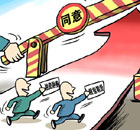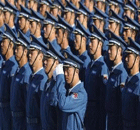Op-Ed Contributors
Frictions along with friendship
By Li Qingsi (China Daily)
Updated: 2010-02-10 07:49
 |
Large Medium Small |
Unlike his predecessor who aggressively pressured China shortly after taking office, United States President Barack Obama and his initially soft stance have led many Chinese people to hold high expectations of him. But it appears that Obama, the recipient of the Nobel Peace Prize, wants to fool or surprise us.
Obama has thrown more troops into Afghanistan, challenged China's core interests by selling arms to Taiwan and is planning to meet the Dalai Lama. Is inflexibility Obama's true face or did he resort to Chinese traditional wisdom in taking strong measures only after courteous ones?
The US economy, which was sinking under the Bush regime, has gained little momentum a year after Obama has come into power with his ambitious "change" slogan. His approval rating has dropped. The Democratic Party majority in the Senate suffered a loss of one seat and consequently, a loss in voting power, possibly threatening the approval of Obama's separate plans for medical and financial reform.
Faced with the Obama administration's provocative actions, the Chinese government has made an equally and unprecedented strong response, warning that it might impose sanctions against US companies involved in the arms sale to Taiwan. The means that China has chosen to deal with the US is what the US has taught China.
An American scholar has long asserted that if the US regards China as its enemy, China will become the enemy. Anyone with a discerning eye can see clearly whether the US considers China as an enemy. But for China, it may not be all bad if the US openly contains it - it could at least alert the Chinese people of the illusions of the US.
The US has constantly brandished the stick of sanctions on China over the past three decades. China, with its rising economic strength, has been forced to retaliate. We hope China's strong response can show the US the bottom line of China's interests.
Perhaps, only when one side loses the benefits brought by cooperation, it can learn to cherish the relationship that it fought hard to gain. However, given that the US still refuses to sell hi-tech products to China, China's needs of the US today may not be equal to the US' needs of China. Let us also not forget that the US' huge budget shortfall is dependent on China, which holds an abundance of foreign exchange reserves, to fill.
But for China, the attitude of granting whatever is requested is not conducive to sound and long-term bilateral relations. Sometimes, struggles will forge better cooperation.
The Chinese used to believe that as long as the nation accepted the existing rules of the global game, China could integrate into the Western-dominated world. For a time, China fell in line with international standards. But this is not the case any more. The US is to permanently maintain its hegemonic interests. China now has two choices: Either act as pawns of the US hegemony or develop self-reliance.
History has proven that China can only choose the latter. China may accept the conflict of interests in China-US relations as a normal condition. Compromises will be temporary.
Nonetheless, the trend that one is on the rise and the other is falling is irreversible. China's rise makes the US feel nervous and insecure. In its economic crisis, it may resort to unscrupulous means.
Selling arms to Taiwan and meeting the Dalai Lama have become the few options for the US to use on the bargaining table of real interests, which have gradually lost their strategic significance. China, on the other hand, holds more and more means to fight back. Nevertheless, China should deal with the challenges calmly and avoid appearing in disarray. It should be fighting on just grounds to its advantages but with restraint.
China's diplomatic behavior is inevitably subject to the influence of its traditional culture - returning good for evil. But this should not apply to those countries that only want China to bear responsibility while leaving China no corresponding rights and interests.
China's diplomacy usually pays more attention to the overall situation, but if the other party cares about nothing, it is necessary to change. China's diplomacy should be based on its own interests and strength, immune from external factors.
Obama's positive stance on China in his State of the Union address is a signal worthy of attention: First, we should not allow success to turn our heads because adulation sometimes is more dangerous than scolding; second, we must guard against its all-out efforts to deal with China - as shown by a military assessment report by the US Department of Defense detailing that the US wants to extricate itself from Afghanistan to focus on China.
It is important to forge a good relationship with the world's only superpower, while China's future lies in its own hands. Only a physically sound body could have a greater immunity to external threats.
The difficulties China might encounter in its rise should be estimated and emphasized, and we should carry out our own affairs to the letter. Politically, people's beliefs should be consolidated; economically, expanding domestic demand and narrowing the gap between the haves and have-nots are the most impending; national defense still needs some ultimate weapons. Despite its economic growth, its security is not as rosy.
The author is a professor with the School of International Studies, Renmin University of China.
(China Daily 02/10/2010 page8)













